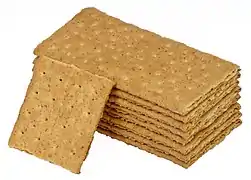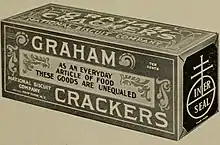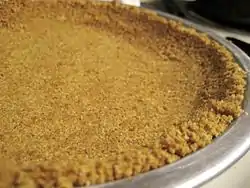 Modern mass-produced graham crackers | |
| Alternative names | Graham wafer |
|---|---|
| Type | Cracker |
| Place of origin | United States |
| Main ingredients | Graham flour |
A graham cracker (pronounced /ˈɡreɪ.əm/ or /ˈɡræm/ in America) is a sweet flavored cracker made with graham flour[1] that originated in the United States in the mid-19th century, with commercial development from about 1880. It is eaten as a snack food, usually honey- or cinnamon-flavored, and is used as an ingredient in some foods, e.g., in the graham cracker crust for cheesecakes and pies.[2]
History
The graham cracker was inspired by the preaching of Sylvester Graham, who was part of the 19th-century temperance movement. He believed that minimizing pleasure and stimulation of all kinds, including the prevention of masturbation, coupled with a vegetarian diet anchored by bread made from wheat coarsely ground at home, was how God intended people to live, and that following this natural law would keep people healthy. Towards that end, Graham introduced the world's first graham wafer product. It was a dull, unsifted flour biscuit baked by Graham himself.[3]
The sugarless wafers were a key component of the eponymous diet.[3] His preaching was taken up widely in the midst of the 1826–1837 cholera pandemic.[4]: 15–27 [5]: 29–35 [6][7] His followers were called Grahamites and formed one of the first vegetarian movements in America; graham flour, graham crackers, and graham bread were created for them. Graham neither invented nor profited from these products.[4]: 29 [6] Herman Melville has an early reference to the crackers in Book XXII, Chapter I of his 1852 novel Pierre; or The Ambiguities:
For all the long wards, corridors, and multitudinous chambers of the Apostles' were scattered with the stems of apples, the stones of prunes, and the shells of peanuts. They went about huskily muttering the Kantian Categories through teeth and lips dry and dusty as any miller's, with the crumbs of Graham crackers.
Production
The main ingredients in its earlier preparations were graham flour, oil, shortening or lard, molasses and salt.[8] Graham crackers have been a mass-produced food product in the United States since 1898, with the National Biscuit Company being the first to mass-produce it at that time.[9] The Loose-Wiles Biscuit Company also began mass-producing the product beginning sometime in the early 1910s.[10][11] The product continues to be mass-produced in the U.S. today.[2]
In earlier times, mass-produced graham crackers were typically prepared using yeast-leavened dough, which added flavor to the food via the process of fermentation, whereas contemporary mass-production of the product typically omits this process.[12][13] The dough is sometimes chilled before being rolled out, which prevents blistering and breakage from occurring when the product is baked.[13]
Uses
Graham cracker crumbs are used to create graham cracker crusts for fruit pies and moon pies, and as a base, layer or topping for cheesecake.[2][14][15] Graham cracker pie crusts are mass-produced in the United States, and consumer versions of the product typically consist of a graham cracker crumb mixture pressed into an aluminum pie pan.[16] The graham cracker is a main ingredient in the preparation of the s'more.[17] Graham crackers are commonly used in place of broas in the traditional Filipino icebox cake mango float.[18][19]
Gallery
 A box of National Biscuit Company graham crackers, c. 1915, which was priced at ten cents
A box of National Biscuit Company graham crackers, c. 1915, which was priced at ten cents.jpg.webp) A s'more
A s'more A homemade graham cracker crust
A homemade graham cracker crust.jpg.webp) A Mango float, an icebox cake dessert from the Philippines using graham crackers, cream, and ripe Philippine mango
A Mango float, an icebox cake dessert from the Philippines using graham crackers, cream, and ripe Philippine mango
See also
References
Notes
- ↑ "Homemade Graham Crackers". Retrieved March 21, 2019.
- 1 2 3 Krapp, Kristine (1997). How Products are Made. Gale. pp. 181–182. ISBN 9780787615475. Retrieved September 12, 2018.
Over time, it became known the graham cracker. Due to its popularity and innovation, other bakeries copied his recipe and eventually developed methods for its mass production. Since then, graham crackers have been a popular snack food. They have also become an important ingredient in pie crust recipes.
- 1 2 Lachance Shandrow, Kim (December 17, 2015). "The Seriously Unsexy Origins of the Graham Cracker". Entrepreneur. Retrieved January 18, 2023.
- 1 2 Iacobbo, Karen; Iacobbo, Michael (2004). Vegetarian America : a history. Westport, Conn.: Praeger. ISBN 978-0-275-97519-7.
- ↑ Smith, Andrew F. (2009). Eating history : 30 turning points in the making of American cuisine. New York: Columbia University Press. ISBN 978-0-231-14092-8.
- 1 2 Tompkins, K. W. (2009). "Sylvester Graham's Imperial Dietetics". Gastronomica. 9 (1): 50–60. doi:10.1525/gfc.2009.9.1.50. JSTOR 10.1525/gfc.2009.9.1.50.
- ↑ Money, J. (1982). "Sex, Diet, and Debility in Jacksonian America: Sylvester Graham and Health Reform". The Journal of Sex Research. 18 (2): 181–182. JSTOR 3812085.
- ↑ Gill, J.T. (1881). The Complete Bread, Cake and Cracker Baker. The Complete Bread, Cake and Cracker Baker. J. Thompson Gill, manager Confectioner and Baker Publishing Company. p. 98. Retrieved September 12, 2018.
- ↑ Smith, A.F. (2013). Food and Drink in American History: A "Full Course" Encyclopedia [3 Volumes]: A "Full Course" Encyclopedia. EBSCO ebook academic collection. ABC-CLIO. p. 409. ISBN 978-1-61069-233-5. Retrieved September 12, 2018.
- ↑ Armstrong, D.; Armstrong, E.M. (1991). The Great American Medicine Show: Being an Illustrated History of Hucksters, Healers, Health Evangelists, and Heroes from Plymouth Rock to the Present. Prentice Hall. p. 59. ISBN 978-0-13-364027-4. Retrieved September 12, 2018.
- ↑ Report of the State Entomologist of Connecticut for the Year ... Bulletin (Connecticut Agricultural Experiment Station). 1915. p. 230. Retrieved September 12, 2018.
- ↑ Matz, S.A. (1992). Cookie and cracker technology. AVI book. Van Nostrand Reinhold. pp. 124–125. ISBN 978-0-442-30892-6. Retrieved September 12, 2018.
- 1 2 The Cracker Baker. American Trade Publishing Company. 1920. p. 6-PA42. Retrieved September 12, 2018.
- ↑ Cole, Edith Walters (1967). "Sylvester P. Graham, "father of the Graham Cracker"". The Southern Speech Journal. Informa UK Limited. 32 (3): 206–214. doi:10.1080/10417946709371875. ISSN 0038-4585.
- ↑ Chilton's Food Engineering. Chilton Company. 1998. p. 69. Retrieved September 12, 2018.
- ↑ Savoie, Lauren (April 10, 2017). "Tasting Ready-Made Graham Cracker Crusts". Cook's Illustrated. Retrieved September 12, 2018.
- ↑ Miller, Jeffrey (July 25, 2018). "S'mores: How this American campfire snack came from the Industrial Revolution". The Independent. Retrieved September 12, 2018.
- ↑ Maryanne (June 15, 2017). "Mango Royale (Mango Icebox Cake)". The Little Epicurean. Retrieved August 31, 2020.
- ↑ "Mango Float". Food Network. Retrieved August 31, 2020.
Further reading
- "Almanac: Graham crackers". CBS News. July 5, 2015. Retrieved September 12, 2018.
External links
- The Origin of Graham Crackers. Snopes.com.
- 7 Things You Probably Didn't Know About Graham Crackers. Food Republic.
- "A Hell of a Cracker" at JSTOR Daily